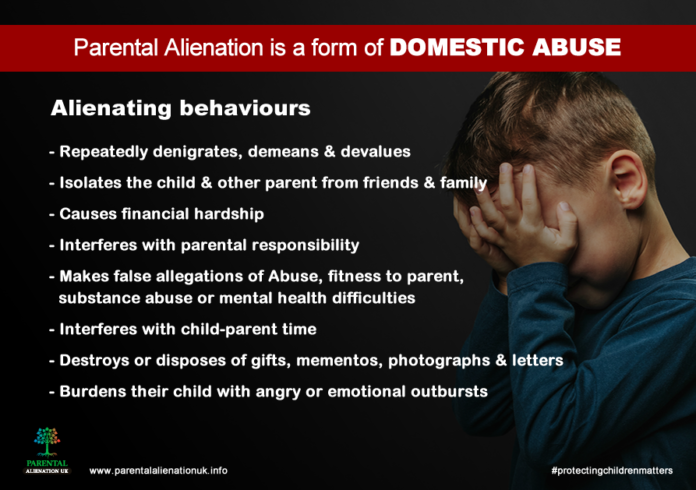By Hannah Summers
Chloe* says she will never
fully recover from the day her
daughter was taken from her following
a family court order.
“Someone slept in my house
because I couldn’t be left on my
own,” she recalls. “I lost nearly
two stone (28 pounds). I couldn’t
breathe, I couldn’t sleep. It was
horrific.” Hitting rock bottom,
Chloe made an attempt on her
own life.
Chloe says evidence that
she’d been a bad mother was
non-existent, and contact between
her daughter and her
daughter’s father had run
smoothly for years. But when
her child revealed she was
“scared of daddy” and refused
to spend time with him, Chloe’s
ex-partner took legal action.
Therapists were brought in
to assess the family; attempts to
force the girl to see her father,
a process Chloe describes as
“child abuse”, failed repeatedly.
Then the court ruled that all contact
between mother and child
should stop for at least 90 days.
“They said I’d ‘alienated’ her,”
Chloe explains.
The story may sound extreme,
but it is far from rare.
Tip of the iceberg
Official data is sparse about
the outcomes of private law children’s
cases – those where private
individuals try to resolve a
dispute in family court without
local authority involvement.
But there has been growing
alarm at the apparent increase in
the number of removals or custody
transfers against the wishes of
children, particularly where there
have been abuse allegations.
Dr Adrienne Barnett, a
non-practising barrister and reader
of law at Brunel University London,
explains: “Up until 2014 the
removals of children from their
primary carers did happen in private
law cases but were extremely
rare.
‘I’ve met women
who have been
beaten, raped and
imprisoned and
whose abusers
got access to their
children – sometimes
full custody’
“However, in
recent years the
small proportion
of published judgments
indicate an
increase – and we
know those are
just the tip of the
iceberg.”
Barnett is regularly contacted
by mothers who describe themselves
as victims of domestic
abuse and have had their children
removed due to allegations of “parental
alienation”.
Belittling allegations
Parental alienation is commonly
described as a child’s unjustified hostility
or rejection of one parent for no
reason other than that they have been
manipulated – whether consciously
or not – by the other parent.
The concept stems from the
theory of parental alienation syndrome.
That was introduced by
the American psychiatrist Richard
Gardner and broadly interpreted
as a means of refuting mothers’
claims of child abuse. The notion
of a “syndrome” became widely
discredited but the concept of
parental alienation as a pattern of
behaviour has gained traction in
courtrooms worldwide.
In the last year, MPs, women’s
rights groups, academics and
organisations such as the United
Nations have raised alarm about
the use of parental alienation as a
litigation tool to counter claims of
domestic or sexual abuse.
Concerns have been raised
about professional acceptance of
the concept and the quality of experts
used by the courts in parental
alienation cases. There is also
a culture within the family court
system that seemingly results in
the minimisation of abuse allegations
by children and their parents.
Proponents of the theory believe
parental alienation is a widespread
form of child abuse and
have launched a petition in response
to a UN report calling for a
ban of its use amid claims of bias.
Drive for transparency
In the forthcoming weeks and
months, TBIJ will dig deeper into
the issue and examine how the
family courts are handling allegations
of abuse in private law cases.
Most of these hearings take
place behind closed doors. That
means public awareness of private
law proceedings is limited to the
small number of published judgments
– or what is documented by
journalists who have successfully
got the strict reporting restrictions
that apply to family cases lifted.
But, in May, private law cases
were brought under a family court
reporting pilot that has been running
in three key locations in England
and Wales since January in a
drive to improve transparency.
For the first time, journalists
are allowed to report what they observe
in these high conflict cases
about child contact as long as the
families remain
anonymous.
Crucially, parents
whose cases
fall under the pilot
can give interviews
to journalists.
That upends
the current
rules, which could
have meant those
talking about
their case publicly
could be found in
contempt of court.
TBIJ will use
the improved access
to family courts in Leeds,
Carlisle and Cardiff – as well as
analysing cases beyond the pilot –
to better understand how decisions
are being reached in some of the
most contentious cases brought
before judges.
Jess Phillips, shadow minister
for domestic violence, believes
increased scrutiny of the family
courts is vital to protect the safety
of children.
The Labor MP tells TBIJ: “The
situation is so poor at the moment
in the courts that we have completely
unregulated people giving
evidence on behalf of abusers and
the courts, and the government
feels completely comfortable
about it.
Phillips believes the public
needs to be more aware of how
parental alienation cases are playing
out in family courts. “I have
an inbox from around the country
with hundreds of cases and in my
own constituency, I am involved
in three live cases at present,” she
adds. “This is always the case –
it’s not a small issue.”
Three years ago the government
published a report that revealed
evidence of a “pro-contact
culture” within family courts. That
culture has arisen as the result of
a law that says having a relationship
with both parents is in the best
interests of children. The report,
however, found the courts place
undue priority on ensuring contact
with the non-resident parent. This
results in the systemic minimisation
and disbelief of allegations of
domestic abuse and child sexual
abuse.
‘I felt like I was powerless
and had no voice. One of the experts
knew I hadn’t done anything
wrong, but they were on the gravy
train’
In November 2020, the Ministry
of Justice launched a review
of the “presumption of parental
involvement”, but the findings are
yet to be published.
Those who advocate for survivors
of abuse say the govern-
‘I felt like I
was powerless
and had no
voice. One of
the experts
knew I hadn’t
done anything
wrong, but
they were
on the gravy
train’
ment’s progress has been disgracefully
slow.
Claire Waxman, London’s victims’
commissioner, says: “We
have a situation now which is so
embedded that anyone who alleges
domestic abuse or says their
children have disclosed abuse is
met with a counter allegation of
parental alienation.
“We knew about this worrying
issue three years ago, but we have
seen a shocking rise in the last two
years of victims contacting us to
share their awful experiences, and
we are frustrated the government
has sat on this and done nothing.”
The use of parental alienation
as a litigation tool has been repeatedly
raised in Parliament in recent
months, including during a debate
in March when Labor MPs called
for an urgent inquiry into the problem
of unregulated experts.
Phillips and the MP Alex Cunningham
reported that mothers
trying to protect their children
from abusive partners were being
accused of alienation by court-appointed
experts with few formal
qualifications and a vested financial
interest in finding “alienation.”
Meanwhile, the MP Taiwo
Owatemi, who had tabled the debate,
called for urgent reforms to
the Children and Family Court
Advisory and Support Service
(Cafcass), which was set up to be
the voice of the child in family
cases.
“Not only are utterly unqualified
individuals being allowed to
testify as supposed experts in these
cases, Cafcass too has overseen a
rise in such allegations,” Owatemi
said.
Forced therapy
In her case, Chloe was told she
would have to undergo expensive
therapy mandated by the court if
she was to have a chance of seeing
her daughter again.
“I had forced therapy as part of
the 90-day process where I was told
I had to change my ways,” she says.
“I felt like I was powerless and had
no voice. One of the experts knew
I hadn’t done anything wrong, but
they were on the gravy train.”
Eventually, she got her daughter
back but only after spending hundreds
of thousands of pounds on
therapy and legal bills. With every
penny of her savings drained, she
had to remortgage her home.
Not all mothers found to have
alienated their children can afford
the therapy. Some have been cut
off from their children for years as
a result.
Labour MP Anna McMorrin
said a “national scandal” was happening
in the family courts during
a House of Commons debate on the
victims and prisoners bill in June.
This part of the justice system continues
to “breed a culture that promotes
contact with those who have
been accused of abuse”, she said.
“Survivors of domestic or coercive
abuse are facing counter-allegations
of parental alienation as a
stock response to their own abuse
allegations. Courts have continued
to instruct unregulated experts
who are connected with the parental
alienation lobby and who are
known for dismissing domestic
abuse victims.”
Unsafe decisions are made as a
result, with sometimes catastroph
catastrophic
consequences for children, said
McMorrin who added that the situation
was now “critical”.
And in May, the Lib Dem MP
Sarah Olney told parliament: “The
continued reliance on self-declared
experts to provide evidence
in family courts is placing thousands
of children and vulnerable
women at risk, with allegations of
parental alienation closely linked
to cases of domestic abuse and coercive
control. I have heard first
hand from constituents just how
dangerous this can be.”
Olney highlighted the UN report
that condemned parental
alienation as a
“discredited and
unscientific pseudo-
concept” used
to undermine
mothers trying to
protect their children
from abuse.
The report recommended
that
states should legislate
to prohibit
the use of parental
alienation and
related experts in
courts.
Meanwhile, in
a landmark judgment
known as “Re C”, Sir Andrew
McFarlane, president of family
division in England and Wales,
said that while there was a “need
for rigor” when instructing psychologists
to give expert evidence,
tighter regulation was a matter for
parliament.
But MPs pushing for change
face a stalemate with the Ministry
of Justice, which insists it is up to
the judiciary to reject inappropriate
experts.
Jaime Craig, a consultant clinical
psychologist who has helped
produce guidance for the Family
Justice Council, says: “The ping
pong backwards and forwards –
whether the matter of regulation is
for the judiciary or the government
– leaves us in limbo with nobody
taking responsibility for protecting
the public.
“Both sides are passing the
buck and, meanwhile,
the courts
can and will still
choose to appoint
psychologists
without the necessary
qualifications.”
****
U K – b a s e d
Hannah Summers
reports on women’s
rights and the
law around the
world.
Some identifying
features have
been changed to
protect contributors to this piece.
If you have been affected by
the issues in this article and want
to share your experiences, please
contact bureaulocal@tbij.com
and put Family Court Files in the
subject line.




